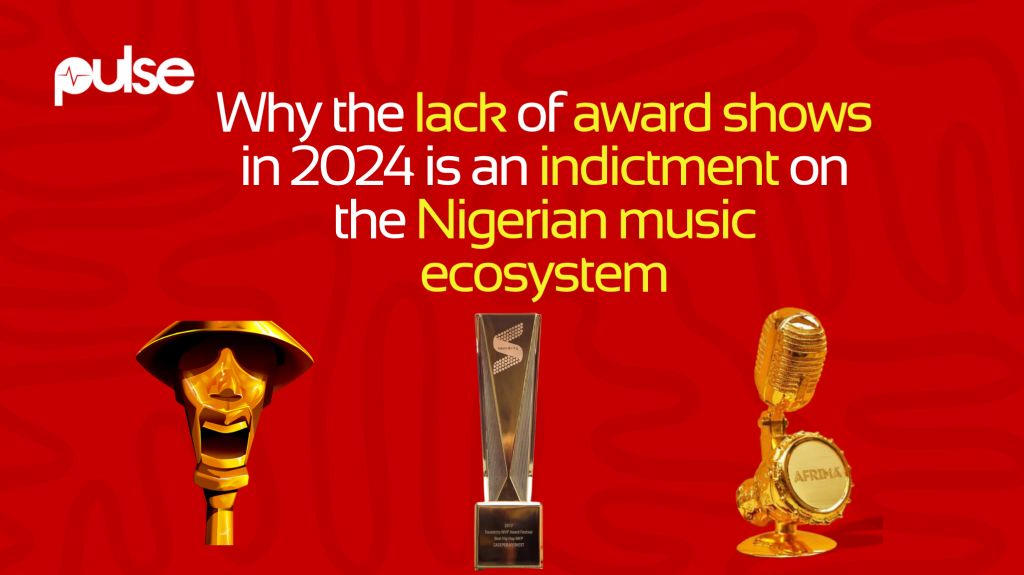
With 2025 just weeks away, it’s almost certain that there will be no Nigerian music award ceremony this year.
The perennial Headies Awards, the SoundCity MVP, and the continental music prize AFRIMA appear to have no plans to hold this year. Even Trace Awards which offered a ray of hope to the Nigerian music award circuit in 2023 is prime to have a gap year.
With no award gala to celebrate the feats recorded in 2024 in Nigerian music, this writer wonders what this glaring lack of structure says about the ecosystem.
How did we get here?
Nothing about Nigeria’s infrastructural decay is new. In fact, the struggles of the Nigerian music industry to develop structures that will consolidate its global rise are reflective of the country’s poor economic indices and lack of sustainable plans.
For nearly two decades, the Headies have been Nigeria’s foremost prize in music. The role it has played in celebrating Afrobeats' success, documenting its trends and evolution, and endorsing future stars for greatness cannot be overstated.
In the past decade, the Headies have suffered setbacks with the recurring issues of credibility which is peculiar to award ceremonies. In spite of this, the Headies Academy has struggled to retain the high standards it set for itself, and with Nigerian music gaining global recognition and stars winning international awards, the country’s biggest prize in music invariably had to take a back seat.
The Academy made a commendable attempt at a comeback through its partnership with the American Embassy whose patronage assisted them in holding consecutive ceremonies in Atlanta. However, the gains of the 16th Edition that saw two of the country’s biggest stars Rema and Asake in attendance may have been eroded with another inexplicable gap year.
It’s almost the same story for other awards ceremonies that kick off with promise but soon begin to struggle to stay consistent due to issues of funding, support, and a decided disinterest by Nigerian music superstars to lend their support to foster the credibility needed to build a strong foundation.
What Must Be Done
This writer believes it’s an indictment on the Nigerian music ecosystem that there’s no single award ceremony in a calendar year.
This lack of structure in rewarding the works of the artists and stakeholders in the ecosystem is even more telling when one considers how Nigerian artists recently submitted their works en masse to the Recording Academy in the hopes of getting a nod.
Nigerian music cannot continue to make strides internationally while these gains are lost on the local industry where stakeholders appear to be solely focused on lining their pockets rather than building structures that will advance and sustain growth.
Economic factors remains the major hurdle with award bodies struggling to garner the financial support to build and maintain these ceremonies. To mitigate this, organisers and academies must lobby the appropriate ministries, agencies, and public officials for valuable governmental support.
In an impressive feat, the Nigerian music industry can boast of having one of its finest executives in the current government in Mr. Obi Asika who leads the National Council for Arts and Culture. Organisers must approach the government and private stakeholders with clear demands for support that will cushion economic challenges.
This writer also strongly holds the view that the Nigerian music award circuit needs new ideas and fresh faces that can reflect the yearnings of a new generation. The gatekeeping that shapes this part of the ecosystem must be replaced with bold and ingenious organisations ready and eager to build, scale, and stay consistent.
Kudos must be given to TurnTable Charts whose bold efforts in collating and documenting music data have created a chart reflective of local music consumption habits. The corresponding award also provides an avenue to celebrate the best-performing songs in the country.
Stakeholders must show support to innovative platforms daring to build structures that can bring credibility and prestige to the Nigerian music award circuit.
While building structures is the first part, consistency, and innovation are what will create platforms that can endure the inevitable tantrums of artists who feel wronged. Nigerian music award organisers can take a lesson or two from the Africa Magic Viewers Choice Award whose prestige is built on top-notch production, proper execution, and consistency.
Bottom Line
By and large, 2024 has come with many lessons for the Nigerian music ecosystem that still has little to show in terms of sustainable infrastructure.
Irrespective of how one feels about these award ceremonies and its subjectivity, they are important in rewarding excellence and documenting the music that shape different eras. They should be handed down to future generations as a worthy legacy.
Every serious music industry should be able to boast of a reputable award ceremony. It’s time for the Nigerian music ecosystem to get to work.